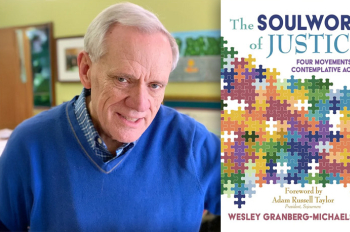
Over the last few weeks, I’ve been pondering some of the issues confronting international mission agencies. To be honest, these are the same questions that the Church as a whole has to face up to, but the impact of such questions varies according to context.
Here, in no particular order (and some are linked to each other), is a list of some of the things that we have to grapple with, I’ll expand on some of them below:
- The breakdown of the post-WWII world order
- The growing influence of AI
- The climate emergency
- Increasing disparity between the poor and the mega-rich
- Increasing migration
- A loss of faith in institutions (including the Church)
- The nature of human sexuality and gender.
And the list could go on.
There is a temptation within some evangelical circles to ignore these sorts of questions.
Now, there is a temptation within some evangelical circles to ignore these sorts of questions; they belong to the world and not to the church. This is all very well, until the Pastor’s son decides he wants to transition to a woman and a dozen Iranians start attending church making some people feel uncomfortable.
Whether we like it or not, we have to face up to issues like this and we need to do so in a way that the pastor’s son (and the pastor) can stay engaged with the life of the church.
Cross-cultural mission agencies are forced to get to grips with some of these questions in a much more urgent way than churches in the UK, Europe, or USA. Some might see climate change meaning nothing more than warmer summers (to which we in the geographical north shout, "hurray"!), however, those working in other parts of the world are already seeing the impact of floods in some places, drought in others, rising seas, and the increase in severe weather events.
Shifting world order
In the aftermath of World War Two, the global situation facilitated the growth of multinational corporations and the free flow of goods and money around the globe. These conditions also helped the growth of Christian mission organizations.
Our structures may find themselves no longer fit for purpose.
Freedom of travel, coupled with the power of certain Western passports made it relatively easy for missionaries to establish themselves in different countries. In terms of their structures, mission agencies often still reflect the way in which big companies are organized internationally with affiliates and subsidiaries in different places. However, as the world order changes; with China becoming increasingly dominant and the USA less reliable, our structures may find themselves no longer fit for purpose.
The question is not so much whether Christian organizations and churches will face changes, but rather how will we respond to them.
Let’s take the issue of the changing world order. It might be tempting to think that our responses to shifting political and economic sands need to be managerial and structural—doing things differently.
Our theology must shape our structures and activities.
While it is true that organizations will probably have to come up with new systems and processes in order to cope with the new emerging realities, the big challenge that we face is learning how to think differently in changing circumstances. Our theology must shape our structures and activities.
Consider what it means for Christians in a world where hostility between nations is on the increase and conflict may not be too far away. Brothers and sisters from different countries have a far closer bond than mere nationality. Our primary allegiance is to the King of Kings, not to any country, regime or ideology.
So, with conflicts rising, we need to demonstrate what it means to be a loving, growing, forgiving community which reaches across borders, by following Jesus and showing a better alternative to the world’s systems.
For mission agencies working in multinational situations, this is a pressing issue and team members are going to have to find ways to deal with hostilities between the nations that they belong to. Simply brushing things under the carpet won’t work.
Increasing migration
The issue of nationality confronts churches when we look at the question of immigration. In terms of action, the Church faces a paradox in that many immigrants come from situations where there are very few Christians—presenting an amazing evangelistic opportunity, while on the other hand, there are also many Christians among those immigrating to the West, strengthening many Christian congregations.
The real challenge of immigration is the fear and hatred that is growing towards those coming to the West.
However, the real challenge of immigration is the fear and hatred that is growing towards those coming to the West. How do we, as people whose allegiance is to something greater than the nation state, speak into this situation?
How do we bring reconciliation and peace into a situation that is fraught with conflicting pressures? Yes, we have a call to welcome the stranger, but we also have to love our neighbors—who may well feel very antithetical to the strangers we want to welcome.
Sexual and gender fluidity
Let’s turn to the issue of human sexuality and gender. The evangelical milieu in which I grew up had a fairly black and white view of these issues: “God made Adam and Eve, not Adam and Steve”.
Same sex relationships and swapping gender were confidentially dismissed as wrong. However, out there in the real world, things were always a bit more complex. Same sex relations are not a modern phenomenon that can be dismissed as a cultural moment, and human gender has never been a binary thing. There has always been a minority of people who genetically, physically or psychologically do not fit into simple male or female identities.
We need to irenically get to grips with some difficult issues.
As Christians we have to navigate this complex world; we might have strong views about what we see as wrong and right, but we are also called to love our neighbor as ourselves. Unless we are happy to see significant portions of the population alienated from the life of the church, we need to irenically get to grips with some difficult issues.
How do we speak peace to someone who feels so alienated from their own self that they are willing to undergo painful surgery and a whole change of identity? Then again, we have to also care for women who feel threatened by having to share what were once female only spaces with biological males.
I suspect that some readers are feeling frustrated because I’ve raised some difficult issues without providing solutions. Sorry about that! The thing is, I don’t have any answers; if I did, I’d write a book and make a lot of money.
The answer to all of these questions... is Jesus shaped.
That being said, I’m pretty sure that the answer to all of these questions (and others) is Jesus shaped. The Gospels paint a picture of Jesus as someone who rejected religious pomposity and who was willing to hang out with the wrong sort of people.
However, it is at the cross that I believe we see the key to getting to grips with the difficult problems of today. When we talk about the cross, it is easy to slip into thinking purely in terms of penal substitution: Jesus was punished in our place for our sins so that we can be forgiven. I don’t want to get into a long discussion about the nature of the atonement, but penal substitution is not the only way in which the Bible talks about what Jesus achieved on the cross.
He defeated his enemies and made a spectacle of them (Colossians 2:15), yes, but it’s another picture of the atonement that I’d like to raise:
For God was pleased to have all his fullness dwell in him, and through him to reconcile to himself all things, whether things on earth or things in heaven, by making peace through his blood, shed on the cross. (Colossians 1:19-20)
How do we bring this reconciling power to bear?
Through Jesus' death on the cross God is reconciling all things in heaven and earth to himself. So what does this look like in practical terms in our divided world? How do we bring this reconciling power to bear in the sorts of situations that I’ve raised above?
In order to answer questions like this, we have to learn to do theology. Far too often, theology conjures up pictures of piles of difficult books. It is identified with doctrine or dogma and presented as a set body of beliefs that are handed down from generation to generation without ever being questioned. In reality, theology is a living context-sensitive way of approaching life’s big questions. Anselm of Canterbury talked about faith seeking understanding in the eleventh century—and we need to rediscover this approach. We have to learn to do theology
Let’s revisit the question of the atonement. The idea of penal substitution spoke powerfully in a society where people had a clear concept of right and wrong (even if they didn’t agree on the details) and understood the need for punishment and forgiveness. However, we don’t live in that world anymore and we are faced by very different questions. (Please note, I’m not denying the reality of sin or our need for forgiveness, but I am questioning whether this the best way in to address our current problems).
If we are confident in the Bible, we won’t be afraid of difficult questions.
Rather than dip into a book of ready answers, we need to dig down into Scripture and reflect anew on how it speaks into our world. If we are confident in the Bible, we won’t be afraid of difficult questions.
Turning back to one of the issues I started with: the Bible won’t tell us what to do when the pastor’s son announces that he is transitioning. However, if we allow it to, it will shape our thinking so that we can know how to bring Jesus into the situation and act according to the love/mercy of God as well as the will/justice of God, just as Jesus did.
Originally published on Dr Eddie Arthur's Living in the Venn Diagram Substack. Republished with permission.
Dr Eddie Arthur has been a member of Wycliffe Bible Translators for over thirty years. For twelve years he and his wife Sue lived in Ivory Coast where they were part of the team translating the scriptures for the Kouya people. He is now based in the UK where he researches, writes, and talks about the future of global missions and provides contextual perspectives on societal change. Eddie's more recent writing can be found on his Substack "Living in the Venn Diagram".






